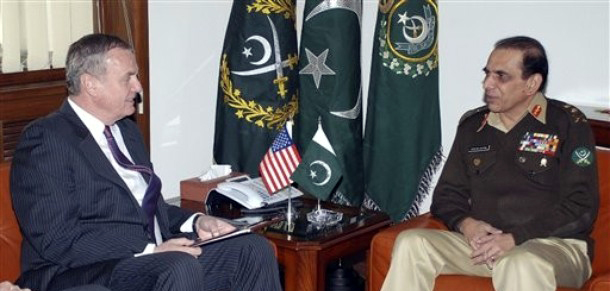
That war is a clash of wills is a cliche. Yet, as one of America’s earliest naval heroes John Paul Jones understood, “men (and by extension women) are more important than guns in the rating of a ship.”
As the struggles in Afghanistan and Pakistan unfold, Jones’s insight will be reaffirmed. But to what end?
The current offensive in Afghanistan’s Helmand province, called Operation “Together” is the precursor of things to come. A majority of the troops are Afghan. “Holding” and not “clearing” is the objective. Beyond the obvious question of the ability and staying power of Afghan security forces to meet this objective, two more powerful determinants are at work.
First is bringing sustainable governance to the people of Helmand and then to a sufficiently large swath of the population to enable the government in Kabul to win the support and legitimacy of the Afghan public. Talk is of a “civilian” surge to assure “holding” takes effect. But thus far the size of this “surge” has not been impressive.
Second, and the Taliban understand this, the NATO-led International Security Assistance Force and the United States face competing and conflicting time lines. These military operations must be seen to succeed and succeed quickly as domestic support for the war is eroding in virtually all NATO member states. The Obama administration has also set a deadline, nominal though it may be, to begin reducing forces by mid-2011.
Pashtun lore is that while NATO (or any intervening force) has all the wristwatches, the Taliban have all the time. Patience is on their side. A further Afghan truism is that all Taliban are Pashtun. But all Pashtun are not Taliban. The significance is that unless or until the broader Pashtun problem of arguably some 40 million people living in the region is addressed, the Taliban issue will simply not evaporate. Recognition and then acceptance of the Pashtun into the political process is crucial.
NATO/U.S. strategy is predicated on reintegration and reconciliation of Taliban into the governing structure of Afghan President Hamid Karzai and his coalition who have never been seen as friends of the Pashtun. Hence, unless our will is strong enough to convince, cajole or coerce the Kabul government to embrace this large minority, “holding” will never fully take hold without the large, long-term presence of foreign forces and lots of money.
Honorable people can disagree on the outcome. Unfortunately, this disconnect or clash between competing time lines and the difficulty in convincing the Karzai government of accepting the Pashtun into the political process seem for the moment to outweigh the more positive factors underlying the current strategy. What then could be a “game changer” if one actually exists? This is a piece of potentially very good news.
Since Sept. 11, 2001, the U.S. government has embarked on a long, tedious and largely unsuccessful process to convince the Pakistani government and especially its army to take on insurgent groups collectively known as Afghan Taliban and specifically the Haqqani network and others. History counts. The mujahedin and associated Taliban fighters were founded and nurtured by Pakistani intelligence, the ISI, in the war to defeat the Soviet Union in Afghanistan that lasted for a decade beginning in 1979. These fighters also were important as a counterweight to India which, for Pakistan’s 63 years, has been perceived as the main threat.
Over the past year however attitudes within the army has been changing. In the view of the senior leadership, many of the Taliban groups have merged with indigenous terrorist organizations such as Lashkar-e-Toiba and al-Qaida. These organizations pose the greater existential threat to Pakistan. And besides, insurgents offer nothing in return for Pakistan in building its economy and bringing basic food, energy, educational, medical and other needs to the public.
In his trip to Pakistan last week, U.S. national security adviser General James Jones met with the top Pakistani leadership and was informed of this seismic shift in attitude. That shift must be matched by the will to carry out the implications and consequences of dealing with Afghan Taliban and other terrorists who operate (freely) across the Afghanistan and Pakistan border and in NWFP, FATA and Quetta often with the knowledge of local authorities.
The significance of this new conclusion, if carried out, will have decisive effect not only for Pakistan but for Afghanistan as well. But far greater will on the part of the United States is crucial to provide Pakistan the economic, trade and military support it desperately needs and that so far has not been delivered in meaningful amounts.
War is indeed about will. And the crucial question is whether we and our Pakistani allies are prepared to exercise the will necessary to succeed in this existential struggle.
Harlan Ullman is senior adviser at the Atlantic Council and chairman of the Killowen Group that advises leaders of government and business. This column was syndicated by UPI. AP Photo.
Image: JonesKayani.jpg
